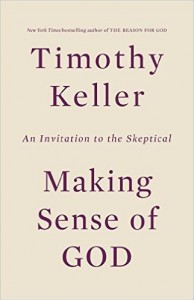 I wrote a post last Tuesday None and Fine With It that looked at recent results reported from the Religious Landscape Survey of US beliefs and trends. This post received extensive comment, much of it from people who are not Christians and gave their views why “none” was a preferred choice. Many of these comments shed light on issues that we, as Christians, need to address, My post on Thursday, Cultivate Humility, focused on the topic of intellectual humility – something that should be a virtue both as a scientist and as a Christian. This post received far less comment, but one person coming over from the Tuesday post noted:
I wrote a post last Tuesday None and Fine With It that looked at recent results reported from the Religious Landscape Survey of US beliefs and trends. This post received extensive comment, much of it from people who are not Christians and gave their views why “none” was a preferred choice. Many of these comments shed light on issues that we, as Christians, need to address, My post on Thursday, Cultivate Humility, focused on the topic of intellectual humility – something that should be a virtue both as a scientist and as a Christian. This post received far less comment, but one person coming over from the Tuesday post noted:
So, does intellectual humility let you recognize and cope with scientific answers that contradict your doctrine?
I must admit to being curious about handling the cognitive dissonance situations like that must create.
This is an interesting question and one I’ve thought about a great deal. Intellectual humility is a posture and attitude that allows us to be teachable and to teach with sincerity. I try to take this posture into pretty much everything I do and teach. In Freshman Chemistry, for example, a posture of intellectual humility leads me to explain why things are true – not proclaim that they are true. I bring a confidence that I understand the material and can answer the questions, but this doesn’t mean that truth rests on my say-so. In other situations, research meetings for example, intellectual humility means putting my ideas, arguments, and conclusions on the table and defending them, but being willing to listen to the criticisms as well. This is how we learn.
Intellectual humility as a Christian leads me to realize that I am a finite human who does not have all the answers. When it appears that science contradicts doctrine it is important to examine both the scientific and the doctrinal claims. Sometimes the so-called scientific claims overreach into metaphysics and philosophy and need to be taken with a grain of salt. Sometimes the claims are at the edges of understanding and we need to wait for further developments. Sometimes, as in the age of the earth, or the message we should take from the first 11 chapters of Genesis, or the way in which we should understand biblical authority, our doctrines need refinement. This is nothing new, each generation of Christians has found it necessary to wrestle with scripture in the light of new information. We need the humility to realize that we are at least as capable of error as those who came before us.
When I started to dig more deeply into the foundations of my Christian faith one of the things I did was purchase and begin to read the writings of the Ante-Nicene Church Fathers (available on-line at ccel as well, here). The Protestant translator of the first book I read was quick to point out that the interpretational methods of these early Christians (and the later post-Nicene writers as well) were flawed, but, if careful, we could still learn from them. The impact of his warning on me was somewhat different than his intent. It raised a question: How do we know when our approach is better or worse than those who came before? We can pretty much guarantee that those who come after us will find some of our methods suspect. Intellectual humility is crucial as we dig for the truth, while aware that we will not get all the final answers. We learn from the past, recognizing that some of this was wrong, and teach for the future, realizing that some of what we say will be wrong. Many ideas need to be held with an open hand, not in a clenched fist.
Sometimes we have to live with a tension between ideas that seem, at least temporarily, irreconcilable as we seek truth.
My views on some “doctrines” have changed somewhat over the years, others have been strengthened. Many of the points brought up in the comments on None and Fine With It are significant issues we should wrestle with. How we understand atonement and the appropriate interpretation of some Old Testament passages are high on the list.
 Which brings me to the focus of this post. A couple of weeks ago Dave Moore reviewed Tim Keller’s most recent book Making Sense of God and I knew immediately that I had to get this book and probably blog through it (Dave’s review: Tim Keller’s Newest).
Which brings me to the focus of this post. A couple of weeks ago Dave Moore reviewed Tim Keller’s most recent book Making Sense of God and I knew immediately that I had to get this book and probably blog through it (Dave’s review: Tim Keller’s Newest).
We live in an increasingly secular culture, although not (as Keller points out in his first chapter) and increasingly secular world. Keller, referencing Charles Taylor (A Secular Age), points out that there are at least three uses of the term secular. A person can be secular, a society can be secular, and an age can be secular.
A secular society is one in which there is a separation of religion and the state. No religious faith is privileged by the government and the most powerful cultural institutions. … A secular person is one who does not know if there is a God or any supernatural realm beyond the natural world. Everything in this view has a scientific explanation. … A “secular age” is one in which all the emphasis is on the saeculum, on the here-and-now, without any concept of the eternal. (pp. 2-3)
In a secular society most individuals could be religious – but of a variety of different perspectives. A secular age, in the air we breath and the water we drink, will permeate even those who are religious, and “thin out” faith.
In the Western world (e.g. North America, Europe, Australia, New Zealand and probably some other places as well) we are in the midst of or entering what is probably best designated a secular age. Religion is not dying out, but the general cultural perspective has definitely undergone a massive shift. This is especially true among those with at least a college education. Keller suggests that religion is not on the decline in the US – the apparent decline is among those for whom religion is a choice rather than an inherited community. In one sense this is hard to argue against – but declines (as indicated in the previous post None and Fine With It ) are hitting even denominations that emphasize the importance of personal choice and a personal God. If a secular age “thins out” faith, it will eventually diminish the ranks of the faithful.
 One important question, then, is how to be a witness for the gospel in this secular age. A second, equally important, question is how to give Christians the tools to thrive in this age. It is hard to thrive when on the defensive or in perpetually uncertain. In almost 30 years of ministry in Manhattan, Tim Keller has wrestled with the questions raised by people in the city. New York is not a particularly religious city and Manhattan is the least religious borough. I have found it hard to find good statistics though. Numbers vary dramatically, depending on how one defines religion. The education level is high (59% of adults over 25 with Bachelor’s degree or more compared with 29% for the whole country, data from the 2010 census), although not as high as my community (which rounds to 71% ), and education feeds into the secular feel of our age.
One important question, then, is how to be a witness for the gospel in this secular age. A second, equally important, question is how to give Christians the tools to thrive in this age. It is hard to thrive when on the defensive or in perpetually uncertain. In almost 30 years of ministry in Manhattan, Tim Keller has wrestled with the questions raised by people in the city. New York is not a particularly religious city and Manhattan is the least religious borough. I have found it hard to find good statistics though. Numbers vary dramatically, depending on how one defines religion. The education level is high (59% of adults over 25 with Bachelor’s degree or more compared with 29% for the whole country, data from the 2010 census), although not as high as my community (which rounds to 71% ), and education feeds into the secular feel of our age.
Tim Keller’s invitation to the skeptical is directed toward this educated audience. He has insights worth listening to and bringing up for discussion. Chapter 2: Isn’t Religion Based on Faith and Secularism on Evidence? will allow us to dive into the deep water. The same commenter quoted at the top of this post noted on None and Fine With It:
The evidence is the evidence, and science follows the evidence. Christianity comes to the evidence with a preconceived premise that there is a supernatural creator, which then biases all the conclusions that follow.
And later in response to another commenter:
But as to the supernatural – it is normal to adopt the null hypotheses.
“Bottom line, we are all living by faith.” No – we are not. Faith is an utter failure as an epistemology. You might live accordingly, but I do not – nor do many others.
Let’s see where Keller takes us in response.
Are we living in a secular age?
If so, what impact does this have on the mission and ministry of the church?
If you wish to contact me directly you may do so at rjs4mail[at]att.net
If interested you can subscribe to a full text feed of my posts at Musings on Science and Theology.





